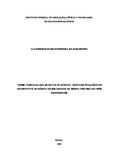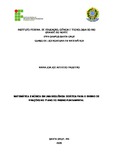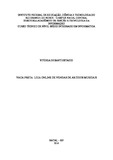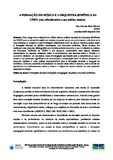“ Nesse tempo falava-se muito de música “ : práticas pedagógicas do Instituto de Música do Rio Grande do Norte (1933-1961) em três movimentos

Visualizar/
Data
2021-04-30Autor
Nascimento, Alanderson Maxson Ferreira do
https://wwws.cnpq.br/cvlattesweb/PKG_MENU.menu?f_cod=80112F079140F4B5415061E43C2F5C2D
Metadado
Mostrar registro completoResumo
This work deals with professional education in the area of music in the state of Rio Grande do Norte in Brazil in the period between 1933 to 1961. It emphasizes the Music Institute of Rio Grande do Norte in Brazil, a specialized music education institute, formalized through Decree no. 425 of January 31, 1933. The research aimed to analyze the institution´s Pedagogical Practices in professional music training. Thus, it considers the historical and conceptual foundations of Pedagogical Practices in Professional Music Education in Brazil. The aim is to understand the institutionalization of this establishment and the aspects related to its functioning, teacher training and the teaching syllabus. As for the methodology used it is of qualitative and exploratory nature, with the use of bibliographic, documental and empirical strategies. As for documental analysis, the work considered documents in printed fonts such as newspapers and magazines that were distributed either locally or nationally during the period. Thus, the research considers Foucault (2008), Certeau (1982), Albuquerque Júnior (2019), Barros (2019), and Ciavatta (2009) were considered. Results show that the institute carried out a Pedagogical Practices based on the musical teaching models applied by the European music conservatories, an education based on the learning of the written musical language and high instrumental performance. In addition to this, it is possible to conclude that, at the time, music education in this institution was exclusively erudite and aimed towards Natal´s upper middle-class citizens at that time, at modernized time and in this perspective, it valued music of European tradition much more than Brazilian music of popular tradition. Finally, it was seen that despite a Pedagogical Practice that demanded high level of development and instrumental performance on behalf of students, the institute was considered a locus that prepared them to meet social demands such as public or family presentations indicating the cultural value of musical training for young people in society, rather than properly preparing them to be a future music professional.
Itens relacionados
Apresentado os itens relacionados pelo título, autor e assunto.
-
Matemática e música em uma sequência didática para o ensino de frações no 7º ano do ensino fundamental
Faustino, Maria Joalice Azevedo; http://lattes.cnpq.br/2675497951101757 (Instituto Federal de Educação, Ciência e Tecnologia do Rio Grande do NorteBrasilSanta CruzIFRN, 2023-04-04)This is a monograph for the completion of the Licentiate in Mathematics course at the Federal Institute of Education, Science and Technology of Rio Grande do Norte - Campus Santa Cruz. It investigated, through bibliographical ... -
Vaca Preta: loja online de vendas de artigos musicas
Estácio, Vitória de Santi; 10396089496; http://lattes.cnpq.br/9133794546469833 (Instituto Federal de Educação, Ciência e Tecnologia do Rio Grande do NorteBrasilNatal - CentralIFRN, 2016-03-30) -
A formação em música e a orquestra sinfônica da UFRN: uma reflexão sobre a sua prática musical.
Morais, Ana Claudia Silva (Insitituto Federal de Educação, Ciência e Tecnologia do Rio Grande do NorteBrasilSão Paulo do PotengiIFRN, 2013-11-30)his article aims to reflect on the musical practice of UFRN Symphony Orchestra about his training in music as performance group, referring to its dynamic testing and collaborative learning among musicians students, as well ...






